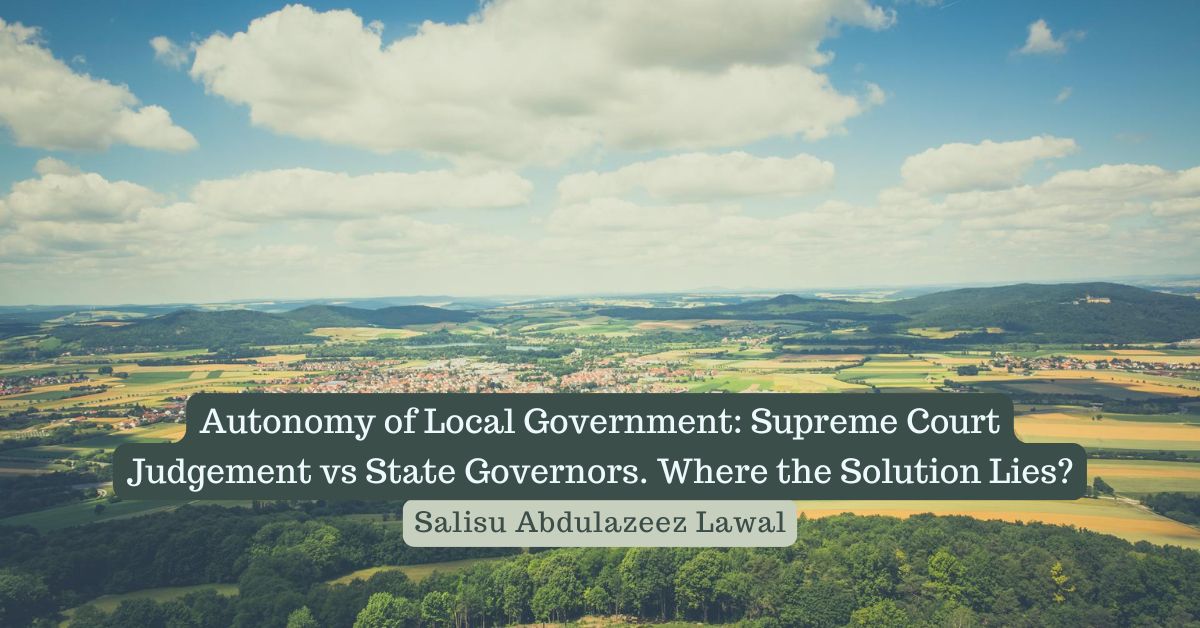Autonomy of Local Government: Supreme Court Judgement vs State Governors. Where the Solution Lies?
Surely, the 11th day of July, 2024, supposed to be a historic day for every local man out there, as the Supreme Court delivered its landmark judgment that affirmed the financial autonomy of the 774 Local Government Councils, coupled with an order that the Federation Account Allocation Committee (FAAC) allocations for these Local Gov’t Councils be credited directly into their respective bank accounts.
As first, it was a legislative move of the Nigerian Senate to passed the Local Government Financial Autonomy Bill, with 92 out of 109 senators voting in favour of granting financial independence to the 774 local government councils across the country. Both the judicial and legislative efforts are aimed to amend the 1999 Constitution of the Federal Republic of Nigeria and to ensure that local governments like states have direct access to their allocated funds without any interference from state governments.
However, Six months after the Court’s order for direct disbursement of the allocated funds to local gov’t accounts, being the apex and highest arbiter of our judicial system, the implementation is still hanging on, raising serious questions about the effectiveness of Supreme Court’s Orders and the broader issue of autonomy of the Nigeria’s third tier of government.
Supreme Court V State Governors
The Supreme Court’s decision was a concrete nail to hammer the financial autonomy of Local Governments by mandating that the FAAC allocations be paid directly into the councils’ bank accounts, as the Court sought to bypass any intermediary or the bureaucratic bottlenecks that have often delayed the steady flow of funds to the grassroots level of government . In theory, the decision was read to empower local governments in enhancing their autonomy and to further promote a more effective governance at the local level. However, the gap between the Court’s Judgment and its implementation is more than an hour journey, which suggests that the road to local government autonomy is still fraught with challenges.
See also: The Practice of Holding Charge by Prosecution: the Position of the Law in Nigeria
Despite the clear wordings of the Supreme Court’s ruling, the non-compliance by many state governments has raised different versions of questions and concerns. One of the most pressing questions is: Who is responsible for ensuring compliance with the order?
The Court’s ruling did not explicitly designate an agency or entity to oversee the implementation of its order, leaving a grey area in terms of accountability.
However, it can be argued that the Accountant General of the Federation, as the custodian of the Federation Account, bears primary responsibility for ensuring that the funds are disbursed in line with the Court’s directive. The Accountant General must ensure that the necessary funds are transferred directly to the local government accounts, eliminating intermediaries that have historically caused delays or mismanagement.
Also, as it was reported on the part of the Attorney General of his signalled intention to take action against non-compliant states, does he have the power to effect such? By order, the practical mechanisms for enforcing it still remain unclear.
Where the Solution Lie?
In observance, the Court could issue further directives to relevant authorities, such as the Accountant General and state governments, compelling them to comply with its ruling. Such intervention would send a clear message that the judiciary is determined to uphold its decisions and ensure the proper functioning of Nigeria’s federal system.
Also, the Attorney General’s office should explore legal remedies to enforce compliance. This could include contempt proceedings against individuals or entities that actively obstruct the implementation of the Court’s order. Strong legal action would serve as a deterrent against future non-compliance and reinforce the authority of the judiciary.
Furthermore, the fight is not meant for government alone, Civil society organizations and the media have a critical role to play in raising awareness about the importance of the issue at stake. Public advocacy can truly help to ensure that citizens hold their leaders accountable for upholding the law and orders.
To prevent future delays or misappropriation , there must be regular monitoring and reporting on the disbursement of funds. Transparency in the allocation process will not only ensure compliance but will also enhance accountability, reducing the opportunity for corruption or misuse of public funds.
In conclusion, the continued non-compliance with the Supreme Court’s order undermines the principles of federalism and local government autonomy that the judgment sought to uphold. It is imperative that the relevant authorities take immediate and decisive steps to rectify the situation. By so doing, they will demonstrate a commitment towards rule of law and a good governance , ensuring that the decision of supreme court is fully adhered to and not tampered with Axiomatically, only true cooperative action, law enforcement and transparency can Nigeria ensure that it’s local governments are empowered to serve their citizens effectively and efficiently.
About Author
Salisu Abdulazeez Lawal is a vigorous third-year law student at the prestigious Ahmadu Bello University, Zaria. He can be reach via email @ Abdulazeezsalisulawal@gmail.com or phone number: 08139952399



Leave a Reply